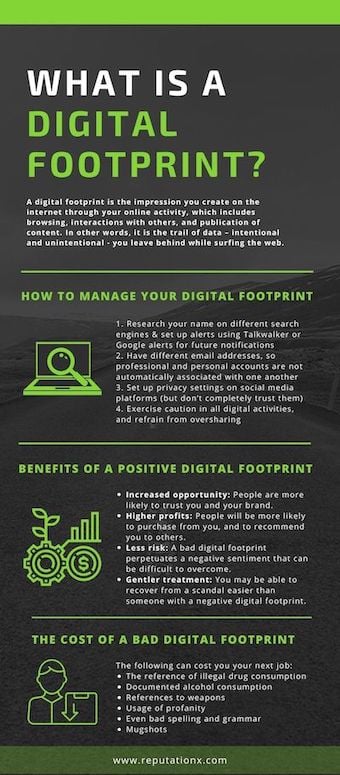
A digital footprint is the impression you create on the internet through your online activity, which includes browsing, interactions with others, and publication of content. In other words, it is the trail of data – intentional and unintentional – you leave behind while surfing the internet. When a site you visit drops a “cookie” in your browser, it contributes to your digital footprint.
This trail of data consists of your posts on social media platforms, your “private” correspondences (i.e. email), the websites you visit, and even the records of your online purchases.
There are two main classifications of digital footprints: active and passive. An active footprint can be defined as the intentional data trail that an individual leaves behind, such as:
- Sending someone an email (you intend for it to be seen by someone)
- Publishing a blog
- Posting on social media platforms (e.g. Linkedin, Twitter, Instagram) – a Tweet, Facebook status update, and an Instagram photo upload
- Filling out forms that involve subscriptions to emails or text updates
This means that a passive footprint would be defined as the unintentional traces that an individual creates on the internet, such as:
- Using apps and websites that use geolocation to pinpoint a user’s whereabouts
- Browsing products and activities, which advertisers compile and analyze to profile you and provide targeted advertisements

Why should you care? How is your digital footprint used?
There are a multitude of reasons for us all to be concerned with the size of our digital footprint and how it represents us. The data we publicize makes us vulnerable to internet fraud (i.e. identity or data theft), unwanted solicitations from organizations and companies, or damage of our personal reputations. Search results for your name or the name of your organizations can be thought of as a part of your digital footprint.
For the purposes of this article, we will be focusing on the latter and how our digital footprint is routinely considered in employment candidacy, company valuations, and even mortgage and loan applications.
77% of potential employers use search engines like Google to screen their candidates, and 35% of these employers admit that they eliminated a candidate from consideration based on the information they found online.
Well, what type of content do employers least like to see in their candidate’s online profiles and history? The answer is unlikely to surprise us. Having any of the following on your digital footprint can turn off 45 to 85% of employers and hiring committees:
- The reference of illegal drug consumption
- Documented alcohol consumption
- References to weapons
- Usage of profanity
- Even bad spelling and grammar
- Mugshots
Continuing on the same thread of employment, it would be beneficial to also highlight occasions that inappropriate and unfiltered behavior on social media has led to early termination. We have all come across a story like this once or twice, but there are countless examples of professionals losing their positions due to:
- Leaking confidential information, such as a Junior Marketing Executive prematurely sharing a new client before their official launch
- Writing prejudiced posts (e.g. racist or sexist in nature) such as a Communications Director making an inexplicable connection between the AIDS epidemic and race
- Sharing improper content (e.g. nudity or drug usage), such as a public school teacher alluding to her intake of drugs on school grounds
- Complaining about or insulting your employer, clients, or stakeholders, such as a marketing contractor insulting clients with the use of expletives
All in all, our digital footprint clearly influences our professional opportunities.

